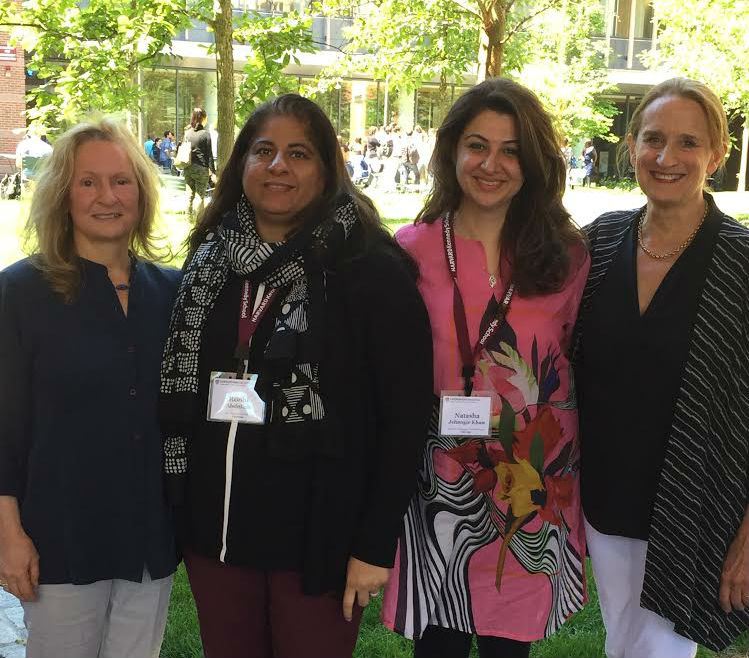Natasha Jehangir Khan and Roohi Abdullah have just matriculated at the Kennedy School’s Mason Program, under the auspices of BBLP. We are delighted with the outcome of our efforts: both are Pakistani women with substantive experience. After years of policy making, for Natasha in Pakistani government and for Roohi, in many countries for the World Bank, they can use the year in Cambridge at the Mason Program to prepare for return to Pakistan to transition into formal roles of authority.

Holly Weeks, Roohi Abdullah, Natasha Jehangir Khan, and Marion Dry.
Natasha Jehangir Khan has 15 years of experience in constitutional, administrative and regulatory work. Having received an LLM at University College London in 2001, she began her career in the office of the Attorney General of Pakistan, and later went on to join the Securities and Exchange Commission, the regulator of the corporate and financial sector of the country except banking, where she eventually served as the Head of Legislation and General Counsel Department. A licensed Advocate of the High Courts of Pakistan, she has worked creating performance manuals, structures and systems to contribute strength to the institutions employing her, a necessity in a developing country where power so often resides in individuals instead of institutions. Natasha has worked as a consultant with several Asian-based development organizations advising the Government of Pakistan on regulatory reforms and enhancement of the investment climate in the country, and was instrumental in developing legislation for transitioning Pakistan’s electricity sector from a single buyer to a competitive market structure.
Natasha plans to use the year at the Mason Program to acquire the connections and skills to facilitate her transition to a role of authority.
Roohi Abdullah graduated from MIT In 1999, where she learned how “the creativity of an architect and the social thinking of a planner” can converge. With over 15 years of experience in international development within the larger scope of infrastructure—ranging from finance, poverty, institutional reforms, water utility management, housing, environment, and carbon finance—she has worked in Iran, Egypt, Jordan, West Bank and Gaza, Saudi Arabia, Iraq, Yemen, Albania, Romania, Azerbaijan, Uzbekistan, Kazakhstan, Tajikistan, and Nigeria, among other countries. “Today I am a long way from Karachi but working in a sector that is largely male dominated, I am reminded that geography aside, women are constantly struggling to attain some level of legitimacy. I am proud to say, that currently I am working with a team developing water investment lending projects in Pakistan. Life has finally come full circle—my thesis work at MIT was on the water sector in Karachi.”
Both Fellows wrote to say that receiving a fellowship with Benazir Bhutto's name on it inspires them to the core. Roohi wrote in her essay, “As the first female prime minister of Pakistan, Benazir Bhutto remains enshrined in our collective global consciousness as someone who forged a new trail for the daughters of Pakistan.”


